VOL. 40 | NO. 36 | Friday, September 2, 2016
Farmers markets growing in number, hanging around longer
By Tim Ghianni
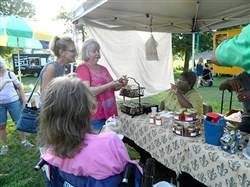
Lynn Jones, right, the “Creole Diva,” works with husband Danny Jones and daughter Latasha Russell selling jams, breads and spices. Shoppers Wilma Mattingly (foreground), Sherry Hampton (left) and Carolyn Crutch check out her wares at the East Nashville Farmers Market.
-- Leigh Singleton | The LedgerWatch out now. Those farmers markets that shoppers are increasingly depending on for their produce might not be disappearing altogether as the season changes. At least not anytime soon.
A seeming bumper crop of farmers markets have continued to sprout since the early spring harvests and, at least until the frost covers the pumpkins, there is no slowdown in sight. And the way things are going, it won’t be long before the markets flourish year-round (more on that later).
But first let’s look at the autumn, an underutilized season for farmers markets, particularly if you think the last fresh kale you tasted was before the hot months fried the harvest. It and other leafy greens make comebacks as summer wanes.
“Right now is one of the best times to go to the farmers markets,” says Greer Gill, state Department of Agriculture’s marketing specialist, who spends her time at Ellington Agricultural Center when she’s not out surveying the markets and talking to vendors and producers.
Gill says most markets continue through October “or through the first frost.”
Of course, the tender greens of the spring harvests are gone, replaced by tender greens of autumn.
Tomatoes, the sexiest farmers market produce, are becoming a bit scarcer after their zenith from mid-July to mid-August. But an increasing number of farmers are using hot houses and “hoop houses” – more portable greenhouses – with the goal of bringing, among other things, fresh tomatoes to the market year-round.
Right now and into the fall “is when you’ll find the most produce,” Gill says. “You’ll find the biggest selection of the bigger varieties… all sorts of tomatoes, summer squash, zucchini, just about anything you are looking for.”
And, she adds, that this is a particularly good time to visit the markets because, in general, business slows this time of year.
“Usually we have higher attendance in the middle of the summer, as opposed to right now, when a lot of people are overwhelmed in back-to-school time.”
When she talks about the markets, she’s not talking about the pop-up produce stands that punctuate the landscape depending on what is in season.
“Right now, our directory has 14 farmers markets listed in Davidson County,” Gill adds.
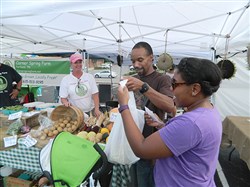
Kia Jarmon, right, and Theo Fletcher organize their bags of produce from the Corner Spring Farm booth at the Hip Donelson Farmers Market. Marianne Cameron, left, sells at Hip Donelson as well as at the White House Farmers Market on Wednesdays.
-- Leigh Singleton | The Ledger(For a statewide directory of farmers markets and information about each of them, including the ones in Davidson County, visit the Picktnproducts.org web site.)
Gill’s love of agriculture runs deep.
“My family owns a farm down in Lincoln Country, where we raise Angus cattle, and my father was in agriculture for a number of years, so I’ve grown up in it.”
And, as the statewide marketing head for these markets, she can vouch for the fact that this notion of a neighborhood grocery, concert site and gabfest is growing.
“I do know anecdotally that there has been an increase not just in Davidson County but across the state,” says Gill, who is in charge of marketing farmers markets, organic farms and the CSA (Community Supported Agriculture) program, in which “subscribers” to a certain farmer pay a weekly fee to get a basket or box filled with the best of what that grower has to offer during that particular season.
There is a pretty simple explanation for the continuing growth of the markets in general.
“Having local food that you know where it comes from, having it be locally sourced from a farmer, is important,” she explains.
In an era in which processed food recalls are played prominently on the morning infotainment programs as well as on the nightly news, these neighborhood markets are sought out for practical reasons.
“Food safety is something everyone is focused on …. I think farmers markets are a great source of that,” says Gill.
Plus, farmers markets “bring communities together.”
A sampling of some of the markets around the county in the last few weeks reveals that community gathering and socializing and establishing an identity is easily as important as crisp fresh produce in drawing people to the markets.
“Farmers markets are community oriented endeavors,” Gill points out. “I have had so many people tell me that this is their social event.
“A lot of the markets are really conducive to that, with live music and other things making it more an outing or an event rather than going to the grocery store, which to most seems dull,” Gill says.
For purposes of distinction, this discussion is not about the Nashville Farmers’ Market down in the shadow of the State Capitol building.
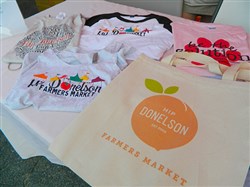
Proceeds from the sale of Hip Donelson merchandise goes right back into the community.
-- Leigh Melton Singleton | The Ledger“I think that is a different entity. It is a destination,” says Gill, adding that the market does go year-round, with suppliers continuing to grow produce in their greenhouses. And, of course, rather than the food trucks at farmers markets around the city, there are brick-and-mortar restaurants at the market in Bicentennial Mall.
“It (the Nashville Farmers’ Market) kind of feeds the whole city center,” she explains.
“I think that is on a different level than what the neighborhood markets do,” she says, adding that the neighborhood markets try to help each other by not all having their mini-midways filled with produce, specialty dairy, custom cut meats, arts and crafts, food trucks and guitar-driven camaraderie all occur on the same day.
This is as much for the customers, who may choose to visit different market sites during the week, as it is for the growers, many of whom work more than one neighborhood market during the week and even venture to the big city market on weekends.
“I do four different markets, five days a week,” says Woody Coppedge, 52, whose Big Lemon stand offers up icy lemon beverages and custom chili dogs to help feed and quench the desires of those who come to browse those markets.
Coppedge, a custom cabinet-maker and counter top builder by trade, now spends all of his time, during the season, at the markets.
“A lot of it is I like dealing with people,” he says, noting that he does play favorites.
“I’ve been at Hip Donelson the longest. It’s home,” he says.
That Friday afternoon market in the heart of Donelson, right along Lebanon Road where Ace Hardware used to be, is the busiest one and the most compressed, resembling a European street market, where swarms of people descend to hang out, buy food, meet their neighbors.
Rich Mahan, lead singer for The Tangled Hearts, smiles and looks out at the Hip Donelson crowd during a set break. Most of the markets have live music, and one thing Nashville is not short on are folks with guitars who want to sing about love, heartbreak and getting drunk.
Mahan and his group, for example, “play ’60s hard country, hard honky-tonk and Bakersfield music,” he says, shortly after he and his band do the classic “Mama Tried,” in salute to the late Merle Haggard, who died this spring.
The soundtrack at other markets varies from Americana to bluegrass to Jimmy Buffett and Eagles-style music.
While the musicians enjoy playing at these markets, they also are, sort of, on the menu if just the right shopper comes through. Never know when some big-shot music exec may be visiting a market on the way home to grab some squash or turnips or tomatoes. Oh yeah, life goes on.
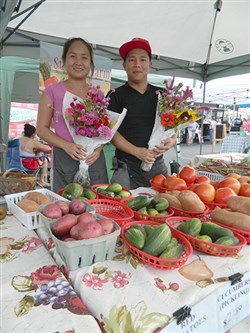
Mee Xiong, left, and Pao Xiong bring Sunrise Farm vegetables and flowers to the Hip Donelson Farmers Market on Fridays.
-- Leigh Melton Singleton | The Ledger“The younger generation I think especially is looking toward local, organic, healthy options,” says Frank Trew, who with Maggie Sidlinger, runs the Hip Donelson market, by far the city’s largest, with space for 83 booths filled with produce, artisan meats and cheeses and even craftwork. “The younger people are concerned about the environment.”
He looks around the asphalt lot filled with people. “This is not just a place to shop. It’s kind of a place to meet their neighbors,” he says. “People come out here to shop, sometimes to eat on Fridays.”
A slew of food trucks lines the Lebanon Road side of this market.
“I’m totally blown away by this,” says Sidlinger. “I wanted to have a local market in the neighborhood (She is a Donelson resident). I love it and I’ve been doing it ever since.”
Trew says there are plenty of good reasons for the success of Hip Donelson. “We are on a Friday, it’s a good way for people to start off the weekend.” Maybe grab some peppers to grill along with that artisan-butchered beef purchased at a meat vendor.
“It’s gotten to be a gathering place,” adds Sidlinger. “It’s great to have this in Donelson. It works for the whole community. I think Nashville’s too big to have just one central farmers market.
“It’s a good place for people to get with their neighbors, listen to local music (she hires only local bands – “at least a third of the bands are from this ZIP Code” – for Hip Donelson entertainment.
She looks around the grounds. “It’s for singles, it’s for seniors, it’s for everybody.”
Vendor Sam Harvey, 36, from Creek Bend Farm in Donelson says this is his third year at the Hip Donelson market. He also takes his butter, goat cheese, produce and meat to the market at St. George’s Episcopal Church.
“The markets are the best way to get your name out. Your product out. It’s good for everyone.”
Course it’s not all peaches and cream, either, although both certainly can be found at these markets during peach season. The peaches are one of the “sexy” fruits, like strawberries before them and tomatoes afterward that draw folks to the markets. The cream, in this case, would be available from an organic dairy farmer.
With such a wide variety of people showing up to shop, non-agrarian trades-folks and artisans also are drawn to these relatively cozy affairs.
For example, hot chicken spice mix is the pet product of a 7-year-old business that has been hatched by brothers Bartt and James Baird.
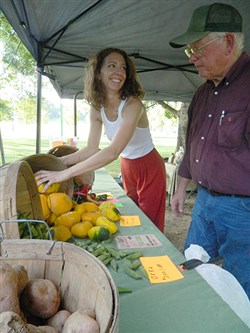
Alexa LeBouef and Ben Simmons work in the Flying S Farm tent at the East Nashville Farmers Market. Simmons, of Cannon County, acts as both merchant and head taste-tester and quality control inspector of the baked goods prepared by his wife.
-- Leigh Singleton | The Ledger“We grew up with local chilcken. Then it became trendy, so we developed our own recipe,” says Barrt. “We started out selling at craft fairs, but we like this market.”
James peppers his brother’s conversation. “We have a lot of fun doing it.”
The brothers are hoping that riches will come from the spice mix. But “you gotta crawl before you can walk, walk before you can run,” says Barrt.
“I think people come to farmers markets because they like to have a relationship with those who make their food,” says Melissa McFerrin as she strolls across the asphalt and through the hip and massive maze of vendors along Lebanon Road.
“I try to make it here every week,” says the bookstore employee from Hermitage. “I like having fresh produce, non-synthetic potatoes, onions and greens,” she says, listing some of her favorites.
Over at Shelby Park, the East Nashville market’s biggest problem is that there isn’t much easy-access parking.
Still, vendors and customers don’t seem to mind.
“This is better than a grocery store,” says Jason Provancha, who left the corporate world to sell fermented fruit drinks.” (I passed, choosing instead to drink my water back when I got to the car.)
“I started making kombucha,” says the former banker and retail manager. “I was researching fermented drinks and started my own business.
“I go to five or six markets a week,” he says, noting there is a pretty big demand for his fermented product.
Just a booth or so over is Andrew Tarpley, who works part-time for Delvin Farms at their booths at various farmers markets. (Hank Delvin could be considered by some the king of farmers markets and his bountiful farm down in College Grove is represented at just about any farmers market in Davidson or Williamson County.)
“The community-based nature of these foods, coupled with quality” is what makes selling Delvin goods to neighborhood residents (in this case East Bank hipsters) so worthwhile to Tarpley.
Our first conversation (that took place a few weeks ago) is interrupted by a young woman toting three bunches of broccoli, some green onions and two bunches of asparagus.
“Hey, you need a bag today?” Tarpley asks, raising a smile on the pretty customer’s face.
“I do, and I brought my own,” she says, pulling it out for him to fill.
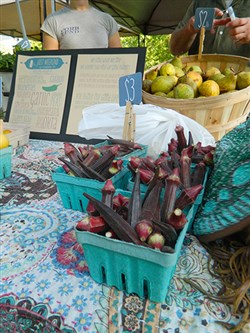
An heirloom variety of okra is displayed at the booth of Lost Weekend Farm at the East Nashville Farmets Market. Varieties such as these that might not withstand long distance shipping are popular at local markets.
-- Leigh Singleton | The LedgerPaul Lassiter of Lost Weekend Farms in Neely’s Bend not only hits the East Nashville market but he also is a regular at the Davidson County Farmer’s Co-Op on Dickerson PIke on Fridays and the Amqui Station farmers market Sundays in Donelson.
“I’m very food-motivated,” he explains. “I like to talk to people about how they use the food. And I give them ideas to uses of the products I sell.”
Lassiter says there is an evolution ongoing at the markets, and it’s been witnessed by his family.
“I talk to my grandfather and a neighbor next to me about how the market used to be when they were my age.”
The Co-Op at 3511 Dickerson Road started the Friday market this year as a way of satisfying the customer base and drawing in more.
“We wanted a way for our customer-producers to be able to showcase their items as they’ve grown or made them,” says Scott Cooper, Co-Op general manager.
The idea is not just to “help benefit them” … but Cooper admits to a sort of selfish benefit. “They can sell here and that way they don’t have to drive to another farmers market. They already are shopping here as customers” to acquire the things (seeds, implements, etc.) needed to grow the produce.
“It’s a way to bring new customers into the store and a way for the member customers and regular customers to have a role in a locally owned business,” he says.
He, too, points to the heavy demand in this millennial-dosed era. “There seems to be a growing movement of supporting locally owned businesses,” he adds. “They build that bond with the farmers and they know where that food is coming from.
“They like the relationship they can have with the market vendors,” he adds. “You go to a box store, you don’t typically get that relationship.”
Former schoolteacher Mary Self loves the fact she’s found herself in the farmers market world.
Not only is she sort of the den mother out at Shelby, she also is manager of the 12South market (in Sevier Park) and the Richland Park market.
She admits to a certain good fortune at finding work in the farmers market world.
“People recognized my talents and successes,” she says, adding that her evolution in this job continues.
“Well, things have sort of changed,” she notes. “I sorta went in as a consultant on the management level and I did some staff training.
“I have stepped away some from the East Nashville market. They have a solid team. I’m helping to build the same kind of team at Richland Park right now.”
And what does she do for relaxation?
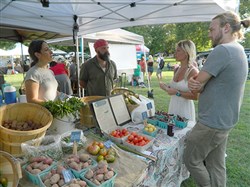
Elizabeth Lassiter, left, and Paul Lassiter, owners of Lost Weekend Farms in Neeleys Bend, chat with shoppers Leah and Joel Larabell at the East Nashville Farmer’s Market. The Larabels, who run High Garden Teas in East Nashville, were inquiring about obtaining some of the pesticide-free products grown on Lost Weekend Farms’ two acres.
-- Leigh Singleton | The Ledger“When I’m not in the farmers market world, I consider myself an urban farmer and I grow fruits and vegetables for a number of families in Nashville,” she says.
She notes that her music business husband has caved in to her needs in their Crieve Hall yard.
“I have transformed most of my back yard into a large vegetable and fruit garden,” she says of her very productive quarter acre.
Course she can’t eat it all. Not only does she sell CSA baskets of what is in season, she also gives away much of her produce to those who “suffer” her fine madness.
“My neighbors put up with me. I have chickens too. I helped the urban chicken advocates get the law passed.”
Her interest in produce dates back to her youth, when “we did have a vegetable garden that my dad tended and I got to help with.
“Then when I was in my mid-20s and wanting to take better care of myself and eat well. I found it hard to afford, when I was a single lady, organic vegetables.
“So I started growing on my patio at my apartment.” That tiny patio garden, of course, seeded her passion that’s displayed in her massive Crieve Hall plot.
She notes that more and more produce-growers are finding the It City hungers for them.
“It’s demand,” she says. “People want to know who is growing their food. They want to put the money for the vegetables in the pockets of the farmer.”
She sees no sign of the boom ending.
“I think people are just becoming more aware of supporting the local economy of their fellow Nashvillians and Middle Tennesseans,” she points out. “They want to support what is happening in their state as well as eating better, knowing where their food is coming from, getting away from eating out of a box. Getting much fresher vegetables and a more feasible lifestyle.”
But she does have one pet peeve: So many people think that the prices of the food from the farmers is more than what they’d pay at a grocery: “People should come out and do some comparison shopping, and they’ll see it’s not as expensive as they thought. It’s sometimes even less.”
Excitement at discovering the availability of fresh veggies in the heart of East Nashville is obvious in the face of 25-year-old Caroline Spall, who moved here recently to pursue her teaching career.
A transplant from New York, she discovered the Shelby Park market, and she was thrilled.
“Sustainable agriculture is very important to me and was important to my family in New York,” she says. “I managed farmers markets in New York City.”
Hip Donelson’s Trew says that sure, the busiest season is July and August, but “we’re starting to see more and more farmers going to hoop houses (portable greenhouses that can cover up a row of plants) and hot houses to try to extend the season. “
Now, the markets all wind down around Halloween, but Trew says that soon will change.
“We’re hoping to see that change in the coming years so we have farmers markets in the winter months.” (He hasn’t worked out the details of the Hip Donelson winter market.)
Those hot houses and other shelters already provide tomatoes long past the time they generally are farmed.
In fact, some of the tomato farmers are beginning to grow year-round, according to Trew.
The reason is simple: “it’s based off customer demand and what the customer is used to, but also the farmer will do what the customer demands,” says Trew, who in addition to founding this market in 2012 also is president of Hip Donelson, a not-for-profit, charitable organization.
In fact, the charitable part is what Trew enjoys most.
“One thing that is a huge passion of mine and drives me to keep going and doing this is the food insecurity piece of the puzzle that people don’t see,” he says, noting that his organization works diligently to double the value of food stamps up to $20 each week.
He said this double-value for SNAP (Supplemental Nutrition Assistance Program) coupons is not restricted to his market, either. “It’s funded by Piedmont Natural Gas,” he adds, of the Hip Donelson generosity.
He stops to describe scenes that touched his heart. “We started seeing kids that were coming through the market that had never eaten squash before.
“During the summer, when they aren’t in school, they are not getting fed.
“The only thing their parents are able to feed them is sugary, processed-food from the supermarket or fast food.’”
The SNAP program at Hip Donelson has grown from 2 percent to 20 percent of the product sold because of this double-your-money program.
Additionally, according to the Department of Agriculture’s Gill, other markets, aided by the AARP Foundation, have established the Fresh Savings program, that also doubles the value of EBT card. “All of the markets who accept SNAP are on our web site.”
Trew gets right to the point when talking about the benefit to the community in general, as illustrated by these kids. “This food in the market is cheaper than the crap they had been eating.
“Seeing these kids being able to eat strawberries and all the other foods, that’s what makes me want to keep the market growing and going.”
By the way, the people who shop these markets are a distinctly different type of musical audience for the bands whose music provides a soundtrack for the shoppers.
Remember Tangled Hearts’ Mahan, who was entertaining at Hip Donelson? Well, he smiles when asked to define the type of audience he’s playing to among the kale and tomato customers.
“I like playing in bars, but it’s a totally different class of people out here,” says Mahan. “People tend to be more sober at farmers markets.”